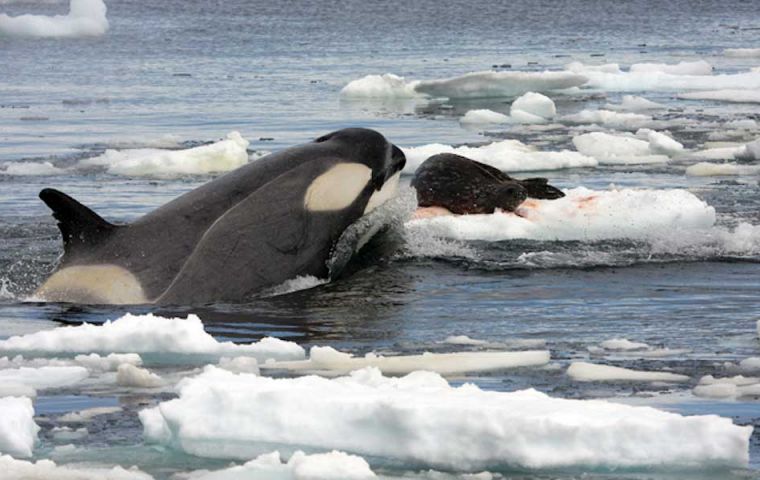MercoPress. South Atlantic News Agency
IAATO mandates acoustic mitigation measures for B1 killer whales in 2025/26 season
 The initiative aims to protect the B1 killer whale population, and reinforces IAATO’s broader commitment to science-based environmental stewardship. (Pic Wikipedia)
The initiative aims to protect the B1 killer whale population, and reinforces IAATO’s broader commitment to science-based environmental stewardship. (Pic Wikipedia) IAATO, the International Association of Antarctica Tour Operators, is mandating members operating in whale rich waters around the Antarctica Peninsula to implement acoustic mitigations measures, reports Anne Kalosh from Seatrade Cruise News.
The initiative aims to protect some of Antarctica’s rarest species, the B1 killer whale population, and reinforces IAATO’s broader commitment to science-based environmental stewardship.
Following successful voluntary trials during the 2023/24 and 2024/25 Antarctic seasons, IAATO members voted to formalize the Maritime Acoustic Awareness Zone (AAZ) as a mandatory operational protocol for the 2025/26 season.
“B1 killer whales rely heavily on sound to coordinate their hunting efforts,” said Maureen Lynch, IAATO’s resource management coordinator. “By minimizing acoustic disturbances in key habitats, IAATO is taking proactive, science-driven action to protect this rare population.”
Located in the Gullet, a narrow channel at the northern end of Adelaide Island critical to the foraging behavior of B1 killer whales, the AAZ was developed to reduce noise pollution from vessels that could interfere with whale communication and cooperative hunting.
IAATO vessels will reduce noise pollution within the AAZ by following the mandated acoustic mitigation measures, which include adhering to a no-go zone of 400 meters when whales are observed, allowing only one ship at a time in the area, reducing the number of engines to a minimum, reducing speed of vessels to a maximum of 10 knots and avoiding the use of thrusters.
Since its inception in 1991, IAATO has worked within the Antarctic Treaty System to ensure tourism activities support the preservation of the region’s natural environment.
As part of this work, IAATO engages with stakeholders such as the Commission for the Conservation of Antarctic Marine Living Resources. CCAMLR has designated two marine protected areas in the Southern Ocean, the Ross Sea region and the Southern Orkney Islands’ southern shelf, with plans to create a network of them.
In 2019, IAATO formally expressed its intent to contribute to the success of marine protected areas. The same year, member operators adopted procedures to mitigate strike risks from vessel operations in whale-rich areas, introducing geo-fenced time areas in the Gerlache Strait and adjacent waters. That commitment was followed up in 2021, with a mandatory 10-knot speed restriction for vessels operating in two IAATO geo-fenced time areas in the Gerlache Strait and Marta Passage, and whale watching.
Two additional geofenced time-areas in the South Shetland Islands and Elephant Island will include mandatory speed restrictions starting in the 2025/26 season following a successful trial during the 2023/24 and 2024/25 Antarctic seasons.



Top Comments
Disclaimer & comment rulesCommenting for this story is now closed.
If you have a Facebook account, become a fan and comment on our Facebook Page!